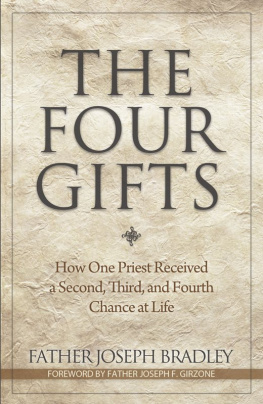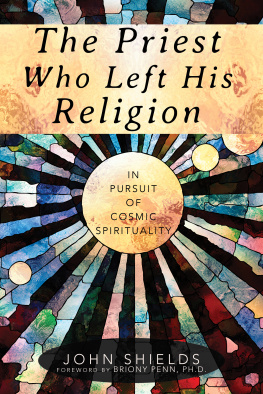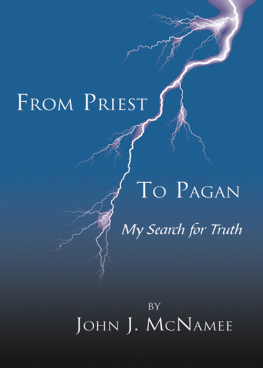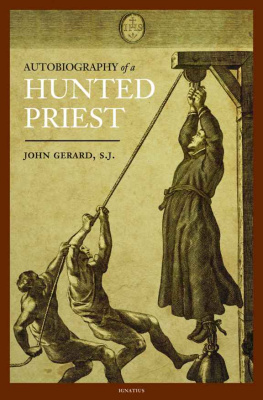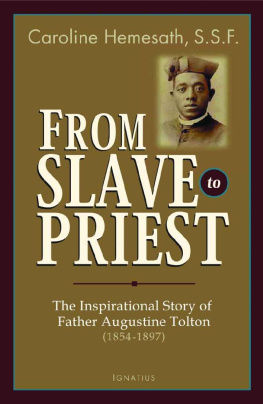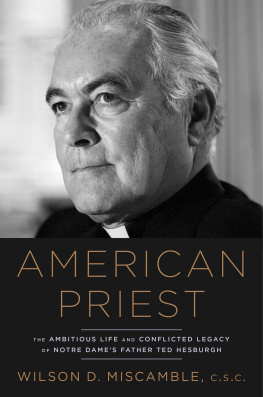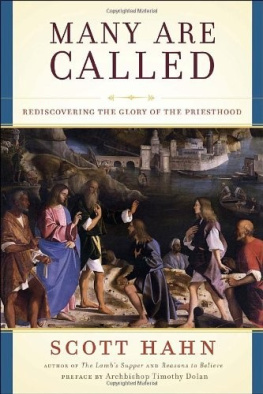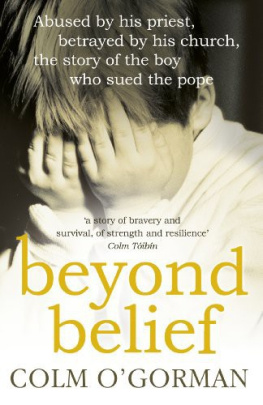Part 1
The First Gift: Reclaiming my Faith
Planting the Seeds
Id always felt comfortable in church. It felt safe. I liked feeling the warmth of family and community gathered in prayer. The atmosphere was strong enough to conquer mind numbing homilies delivered by the vast majority of our parish priests. I looked forward to weekend Masses when young seminarians would visit the parish and break out their acoustic guitars and belt out some folk rock for the Communion meditation. I would reverently follow Mom and Dad to receive Holy Communion and walk back to my seat to the tune of Simon and Garfunkles, Homeward Bound. Dad would roll his eyes as the seminarian belted out verse after verse, while Mom would gently tug on his shoulder whispering something like, Oh, John, relax, they mean well, and the kids like it.
Dads roots were solidly grounded in the Latin Mass; he loved the majesty of the language and the formality of the liturgy. I think its safe to say that guitars, holding hands while singing the Our Father, and top forty hits as recessional hymns were a tad bit challenging for him. But for me, it absolutely worked. It was soothingeven fun, and the seminarians seemed so real, like people we could actually talk to about the challenges of growing up in the mid-60s.
My Dad grew up with a completely different perspective of Church. He was raised in Kilsyth, a tough middle class town in Scotland, a hotbed of religious intolerance best defined by the never-ending battle between Catholics and Protestants. To this day, I remember Dad telling me that, as a child, he was taught (and resolutely believed) that Protestants were one step from hell from the moment of their conception. By direct contrast, Catholics held an uncommonly graced position in the Sacred Heart of Jesus. There was absolutely no room for middle ground. You were either in or out. Period. Amen. Alleluia.
I remember as a youngster asking how, simply walking the streets of Kilsyth, he could tell the difference between a Catholic and Protestant? Simple, he replied, It was all about the scarf you wore around your neck.
He was deadly serious.
It seems that scarf attire worn while attending a local soccer match was the visible mandate of all future destinies. A blue scarf depicted loyalty to the Protestant faith and fidelity to the local Ranger soccer team. By blessed contrast, a green scarf not only showed reverence to Holy Mother Church, but it also signified loyalty to Gods privately owned soccer team:
Celtic United.
There it was: Good versus Evil.
Eternal life versus eternal damnation.
Nothing more and nothing less.
Dad would proudly tell me stories of roaming the streets of Kilsyth, wearing the green just daring the local Protestant hoodlum to look at him the wrong way. I sensed it was something of a rite of passage into Scottish manhood for many a young lad. The first time he defended the honor of his faith and battled with a Protestant was a mix of religious affiliation and/or un tempered zeal at a local soccer match.
Braveheart on the streets of Kilsyth.
Kick ass for Jesus.
To be honest, the image confused me because I couldnt figure how Jesus would somehow support an enthusiastic beat down in his name. Still, politics and global religious intolerance aside, I had great respect for Dads commitment and devotion to his faith, and it was clearly the source of his strength. His faith was rigid and unyielding, but it defined his life and beliefs.
Dad wasnt one to shout his faith from the mountaintop, nor was he a man to offer an elegant reflection at a Sunday Mass or weekday church gathering. He lived his life simply, but with the highest of integrity. He walked the talk. He was generous to a fault and anyone down and out would find a sympathetic friend in Dad. When he offered himself in service, he did so without calling any unnecessary attention to himself. He saw Jesus as the living, breathing Source of his life. Dads faith was devout and traditional, and he wouldnt have it any other way. I loved him for the man he washonest, straightforward, and fearless.
But I do think we had different visions and interpretations of Jesus and his ministry. From my earliest days as a child, I saw Jesus as a wonderful, edgy radical with a passion to defend the outsider, the one who was lost. To me, he was the ultimate healer. He wasnt a Warrior God, he was a man of understanding and peace. I loved the complexity of His message and the fact that it was hard to grasp and even harder to live.
I admired the image of Jesus standing up to the authority figures of his day demanding that they care for the less fortunate. I loved that He was a troublemaker who had a soft heart for the lonely and those beaten down by life. I liked that He was fearless to challenge people to the demands of life in His kingdom. Even as a youngster, that was my attraction to Jesus. To me, He was the original countercultural rebel who stood defiantly against the social mores of His time. The love He preached was beyond radical. I mean it was flat out silly Love your enemieswho lives like that? But that is what I genuinely respected about Him, and it was the image I brought with me to Catholic elementary and high school.
Catholic School
My initial image of Jesus as something of a long haired, wandering hippie, preaching selfless love to the tune of Michael Row the Boat Ashore was soon vanquished when I met the priests at St. Catherines. They were a curious lot, to say the least.
Adorned daily in formal clerical collar and black suit, they were men of mystery. As youngsters in grammar school, we didnt know a thing about them. Other than a quick wave of the hand (while not breaking stride), they rarely interacted with us. We saw them at Mass and behind a screen in the Confessional, but that was about it. They were a total mystery to much of the school community.
However, each semester, Father would dramatically enter our classroom on Report Card Day. It was a monumental event. We would immediately rise to our feet when he entered the room and Sister, the person who actually taught the class, introduced him with equal reverence. Father would glance at each card and offer a brief social and theological commentary before calling each boy or girl to the front of the class to receive his or her grades. If the student received a low grade in conduct, they were met with a dramatic stare down, much like two boxers receiving instructions from the referee while staring at each other before the first bell. Intimidation was the order of the day, and Father always won. Who could compete with an adult male dressed in black who offered a commentary that included insights shared in Latin?
We were taught that Father took the place of Jesus at our liturgies. If that was the case, well, Jesus was quite a bit more authoritative than Id initially imagined. We were flat out afraid to breathe at Mass, except to answer the prayers in a timely manner. I never really gave priesthood much of a thought during my elementary years of Catholic education. I sensed that the priests in black suits were somewhat removed from the altruistic and charismatic Jesus, who captured my imagination as a youngster.
All that changed when I entered Serra High School and sat in the classroom of Fr. John Kelly. He was a genuine maverick and years ahead of his time. He brought the Jesus I loved home to all of his students. The radical Jesus in jeans and T-shirt suddenly reappeared with passion and a thirst for social justice and peace.
Our theology class wasnt lecture, it was discussion. Fr. Kelly would weave stories of Vietnam, Kent State, and Watergate into our consciousness, then hed lower his glasses to peer out and ask, Just what do you think this crazy Jewish carpenter is thinking about all this?
All of a sudden my original image and attraction to Jesus was resurrected before me. Fr. Kelly offered a portrait of Jesus that was dramatic and inspiring. I was taken in by his presentations. Jesus vision of faith was grounded in actionPraxisas opposed to short-term memorization of prayers.
Next page
